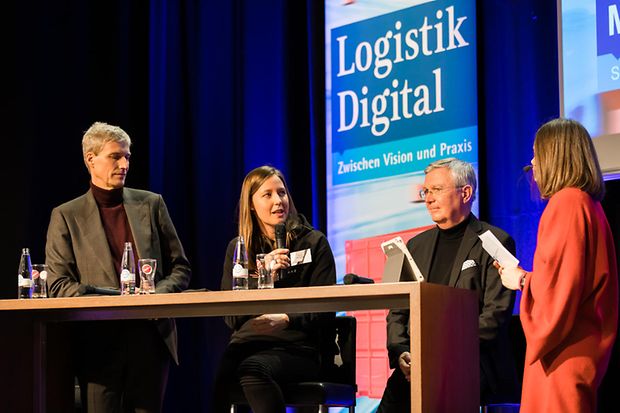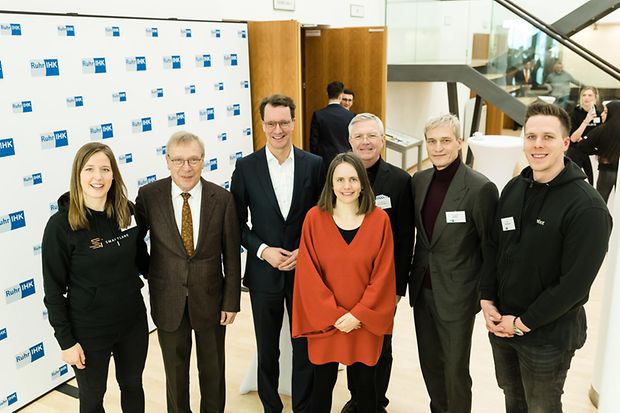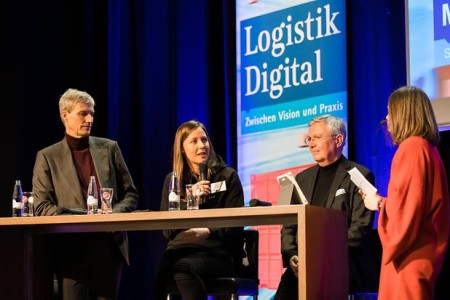Daily press, 2020-02-19, 04:00 pm
Start-ups creating digital solutions for logistics
(19.02.2020) Interconnected processes, autonomous systems and sensor technology – digitization is taking hold in many areas of the logistics industry. Examples of this were provided by Thyssenkrupp Steel Europe, Bohnen Logistik and many other participants at the “Logistics Digital” Congress of the Ruhr Chambers of Commerce and Industry (IHKs) in Duisburg on February 19. As important as digital processes is the role played by hardware: roads, railways and waterways have to be maintained in good condition to ensure the smooth transportation of freight from the Rhine-Ruhr conurbation.

The presentations, podium discussions and meetings at the Congress made it clear that many companies are already using digital technologies to handle their logistics. But industry can only benefit from the advantages of digitization with the support of a reliable infrastructure. The low water levels on the Rhine in recent summers have shown just how closely production and logistics are linked. IHK President Burkhard Landers: “A bottleneck on the Rhine and Ruhr can quickly develop into a nationwide problem for industry. That means that protecting the future of Europe’s biggest steel production site here in Duisburg is a national task. So we welcome the call from our Mayor Sören Link for talks between everyone involved, the sector, the employees, and federal and state governments. We endorse this initiative because it concerns tens of thousands of jobs and a key sector for the future.”
Automated truck handling saves time at Thyssenkrupp
For industrial companies like Thyssenkrupp, digitization plays an important role. Dr. Arnd Köfler, Executive Board Member of Thyssenkrupp St eel Europe, sees the changes brought by the digital transformation as an opportunity for logistics: “For us, digitization is a strategic task which we are tackling simultaneously in many areas of the steel plant. We also see considerable potential for us in logistics. One example: We now handle over 2,000 truck movements per day digitally on the basis of automated driver self-check-in. This cuts the number of process steps from 70 to two, which saves a lot of time, reduces congestion and also improves safety and transparency.”
Above all input from start-ups is driving the digital transformation in logistics. Duisport subsidiary Bohnen Logistik, for example, uses artificial intelligence developed by start-up company Heuremo for its transport management processes. “We got into contact with Bohnen Logistik easily through the Accelerator program of the startport innovation platform. A partnership that creates real value both for the company and for society: In Germany trucks are responsible for eight million tons of avoidable CO2 emissions per year – our transport management system helps reduce this,” says founder Sven Spiekermann.
North Rhine-Westphalia’s Minister of Transport Hendrik Wüst pointed out the importance of digitization for better and cleaner mobility. “The aim of the state government is to ensure that forward-looking technologies are researched, developed, tested and where possible also produced here in North Rhine-Westphalia. We are using the opportunities offered by digitization to link together the various modes of transport, for better and cleaner mobility. In North RhineWestphalia, Germany’s leading logistics location, we need new ideas so that we can improve mobility together.”

Increasing importance of IT security
But the use of innovative technologies also creates new challenges for logistics. Numerous interfaces between companies along the supply chain are vulnerable to attack by cyber criminals. The interlinking of logistics processes therefore places increased requirements on IT security. “According to the Allianz Global Risk Barometer 2020, cyber risks are the most serious business risk for companies around the world – especially for highly interconnected players in the logistics sector. Conscious management of this risk and the structured planning of measures should therefore be the top priority,” says Tobias Rademann, Managing Director if IT consultants R.iT.
Around 250 participants from the whole of North Rhine-Westphalia and beyond joined in discussions with well-known speakers from Thyssenkrupp Steel Europe, Bohnen Logistik, R.iT, TV personality and investor Frank Thelen and startup companies such as Smartlane and ForkOn.
Impressions of the event are available on Twitter under #GemeinsamDigital and the Facebook page of the Lower Rhine Chambers of Commerce and Industry: www .facebook.de/ihk.niederrhein.
Contact
Maike Müßle
0203 2821-275
0203 285349-275 (Fax)
[email protected] .de
Contact details
Niederrheinische Industrie- und Handelskammer Duisburg-Wesel-Kleve zu Duisburg
Mercatorstrasse 22–24
47051 Duisburg
Telephone: 0203 2821-0
Email: [email protected]





